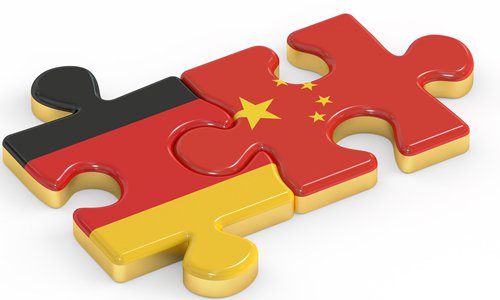HOME >> OPINION
Pragmatic China ties in Germany’s interest
By He Zhigao Source:Global Times Published: 2019/9/24 20:28:40

Photo: IC
With the recent escalation of global trade disputes, relations among major powers have become the core of geopolitics. China's close cooperation with Central and Eastern European countries and increasing trade and investment in Western Europe have had an impact on Germany. To step up engagement with China or to keep away from it? To seek normative or pragmatic China-Germany diplomacy? To value ethics or the market? Such issues are confronting Germany in developing relations with China.Germany's policy on China can hardly shed disputes between norms and interests. German Chancellor Angela Merkel advocated value-oriented diplomacy during the early days of her administration. But during her third term in office, her government reflected on value-oriented diplomacy and began to emphasize both values and practical interests. China-Germany diplomacy turned more pragmatic and stable.
In March 2014, during President Xi Jinping's visit to Germany, the two countries issued the Joint Statement on the Establishment of China-Germany All-round Strategic Partnership.
But as Merkel entered her fourth term, there were noises about relations. From Germany's perspective, China is not only rising in terms of geopolitics and geo-economics, but also plays an important role in defining global norms, including institutional norms, market norms, and even the norms of way of life and work, which have impacted Germany and its enterprises.
But it's noticeable that economic, trade and investment cooperation between China and Germany is quite close and shows a win-win situation. Data released by the Federal Statistical Office of Germany showed that bilateral trade reached nearly 200 billion euros ($220.4 billion) in 2018. Germany has been China's largest European trading partner for 43 consecutive years, while China has been its largest trading partner worldwide for three consecutive years.
According to the World Investment Report released by United Nations Conference on Trade and Development (UNCTAD), Germany invested about $3.68 billion in China in 2018. A survey conducted by German Chamber of Commerce in China indicated that German investment focuses mainly on the machinery/industrial equipment and automotive sector, followed by commercial services, plastics and metal products.
When China invests in Germany, it has introduced its own cutting-edge technology and created new jobs. More importantly, China and Germany jointly safeguard the multilateral trading system and support free trade. China-Germany cooperation can reverse anti-globalization and promote the healthy development of globalization, which is also an impetus to deepening China-EU comprehensive strategic partnership.
In theory, any diplomatic actor would pursue normative diplomacy, with various aims due to different time and backgrounds. Normative diplomacy can be either a goal, that is, to use diplomacy as an approach to seek discourse power, or a device to make use of normative initiatives to meet its interests.
Value-oriented diplomacy and economic diplomacy are two cornerstones of German diplomacy. How to balance them is not only the strategic focus of German leaders, but also the result of Germany's internal wrangling and debates. To pursue value-oriented diplomacy at the expense of economic diplomacy, or vice versa, or to explore a third way between the two, will remain a contentious point of German foreign policy toward China.
Influenced by politicians and media, German businesses and people view China as a remote, strange and fragmented country with various labels. China needs to strengthen cultural exchanges with Germany, as a better mutual understanding is a prerequisite to enhancing bilateral relations.
China and Germany have channels of communication, such as high-level visits, regular governmental consultation mechanisms and more than 70 dialogue and cooperation mechanisms including China-Germany Economic Advisory Committee and China-Germany Joint Commission for Economic Cooperation. There are also academic exchanges as well as various activities organized by embassies, chambers of commerce, Chinese Cultural Center and Confucius Institute. All these will help increase mutual understanding and support between the two countries.
German diplomatic policy toward China is not only about bilateral relations, but also plays an important role in China-EU cooperation and has global significance. With rising economic strength and political influence of China, German politicians and businesses need to seek a more pragmatic balance of interests with China, and establish a model of win-win cooperation transcending the different ideological and value norms.
The author is a research fellow with the Institute of European Studies, Chinese Academy of Social Sciences. opinion@globaltimes.com.cn
Posted in: VIEWPOINT